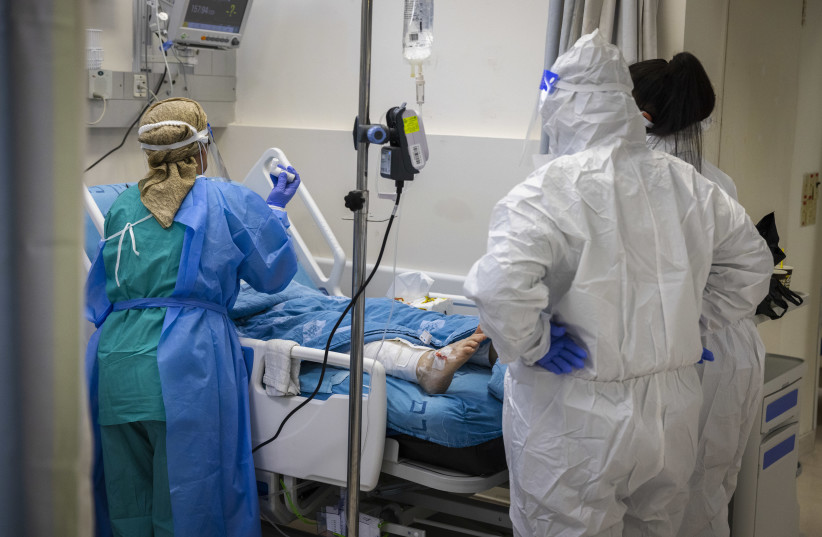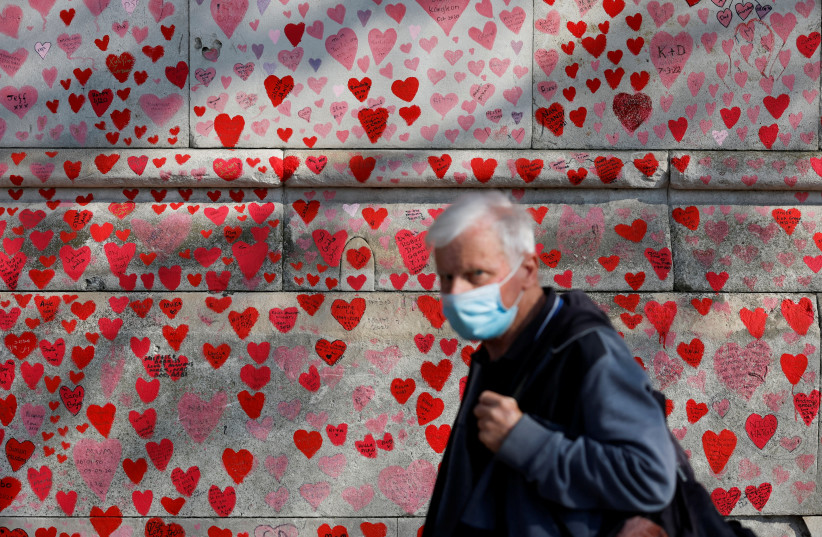One in eight adults who are infected with COVID-19 suffer from long-term symptoms that have become known as “long COVID” symptoms – such as loss of smell or taste, body aches and trouble breathing – for months after their infection, according to a new study from the Netherlands.
The study, conducted by researchers from the University of Groningen and the Radboud University Medical Center and published in the peer-reviewed general medical journal The Lancet early Friday morning, asked COVID-19 patients to regularly fill out digital questionnaires on 23 symptoms commonly associated with long COVID.
21.4% of respondents experienced at least one new or severely increased medical issue three to five months post-COVID-19 infection compared to before infection. Some of the medical issues reported by participants included symptoms such as chest pain, difficulty breathing, pain when breathing, sore muscles, loss of taste or smell, heavy limbs and general fatigue.
"Long COVID is an urgent problem with a mounting human toll"
Aranka Ballering, first author
In comparison, the responses submitted by the COVID-19 negative control group indicated that only 8.7% of people who had not contracted the virus experienced a new or increased medical issue in the same time period. Thus, researchers were able to reasonably conclude that roughly one in eight COVID-19 patients in the general population experienced long-term symptoms due to COVID-19.
What long-term symptoms were most commonly reported?
Among the 1,782 COVID-19-positive patients who participated in the research, the most commonly reported long COVID symptom was loss of taste or smell, with 135 people reporting that they experienced a substantial increase in symptom severity.

The second-most reported medical issue increasing in severity was muscle pain (130 people), and in third place was general fatigue (88 people).
Restricting the definition of long COVID to core symptoms showed that 21.4% (381) of the 1,782 COVID-positive participants had at least one symptom increase substantially to at least moderate severity 90-150 days after the initial infection. In comparison, only 8.7% (361 people) of the 4,130 COVID-negative control group participants had experienced any medical symptom increase in severity during the same length of time.
This finding indicates that in 12·7% of patients (or 1/8 people) with COVID-19, the increased core symptoms with moderate severity at 3 months after COVID-19 could be attributed to SARS-CoV-2 infection and thus long COVID.
How was the study conducted?
Conducted in the Netherlands, the study looked at data collected by researchers asking participants of the population-based Lifelines COVID-19 Cohort - established to assess the psychological and societal impacts of the pandemic - to regularly fill out digital questionnaires on 23 symptoms commonly associated with long COVID.
The questionnaire was sent out 24 times to the same individuals between March 2020 and August 2021 meaning participants who had COVID-19 during this time were infected with the SARS-CoV-2 alpha-variant or earlier variants.
The researchers have stressed that there were several limitations to the study, including the fact that there is no data included from the time period when Delta and Omicron variants were causing the majority of cases. Additionally, most of the data was collected before the COVID-19 vaccine rollout in The Netherlands so the number of vaccinated participants was too small to analyze.
Other limitations faced include the possibility that, due to asymptomatic infection, the prevalence of COVID-19 in this study may be underestimated, and symptoms such as brain fog, which have been identified elsewhere as potentially relevant for a definition of long COVID, were not included in this particular study.
The importance of understanding long COVID
Speaking about the importance of the research, lead author Prof. Judith Rosmalen from the University of Groningen says that "there is urgent need for data informing the scale and scope of the long-term symptoms experienced by some patients after COVID-19 illness."
"However," she continues, "most previous research into long COVID has not looked at the frequency of these symptoms in people who haven’t been diagnosed with COVID-19 or looked at individual patients’ symptoms before the diagnosis of COVID-19.”
P.h.D candidate and first author of the study Aranka Ballering added to Rosmalen's remarks, saying that "these core symptoms have major implications for future research, as these symptoms can be used to distinguish between post COVID-19 condition and non-COVID-19-related symptoms."

"Post-COVID-19 condition, otherwise known as long COVID, is an urgent problem with a mounting human toll," she continues. "Understanding the core symptoms and the prevalence of post-COVID-19 in the general population represents a major step forward for our ability to design studies that can ultimately inform successful healthcare responses to the long-term symptoms of COVID-19."
Future plans for the study
“Due to the timing of this study, we were unable to assess the effect of COVID-19 vaccination and different SARS-CoV-2 variants on long COVID symptoms. We hope future studies will provide answers on the impacts of these factors,” Prof. Rosmalen noted.
“Future research should include mental health symptoms (e.g. depression and anxiety symptoms), along with additional post-infectious symptoms that we could not assess in this study (such as brain fog, insomnia, and post-exertional malaise). We were unable to investigate what might cause any of the symptoms observed after COVID-19 in this study, but we hope future research will be able to give insights into the mechanisms involved."
